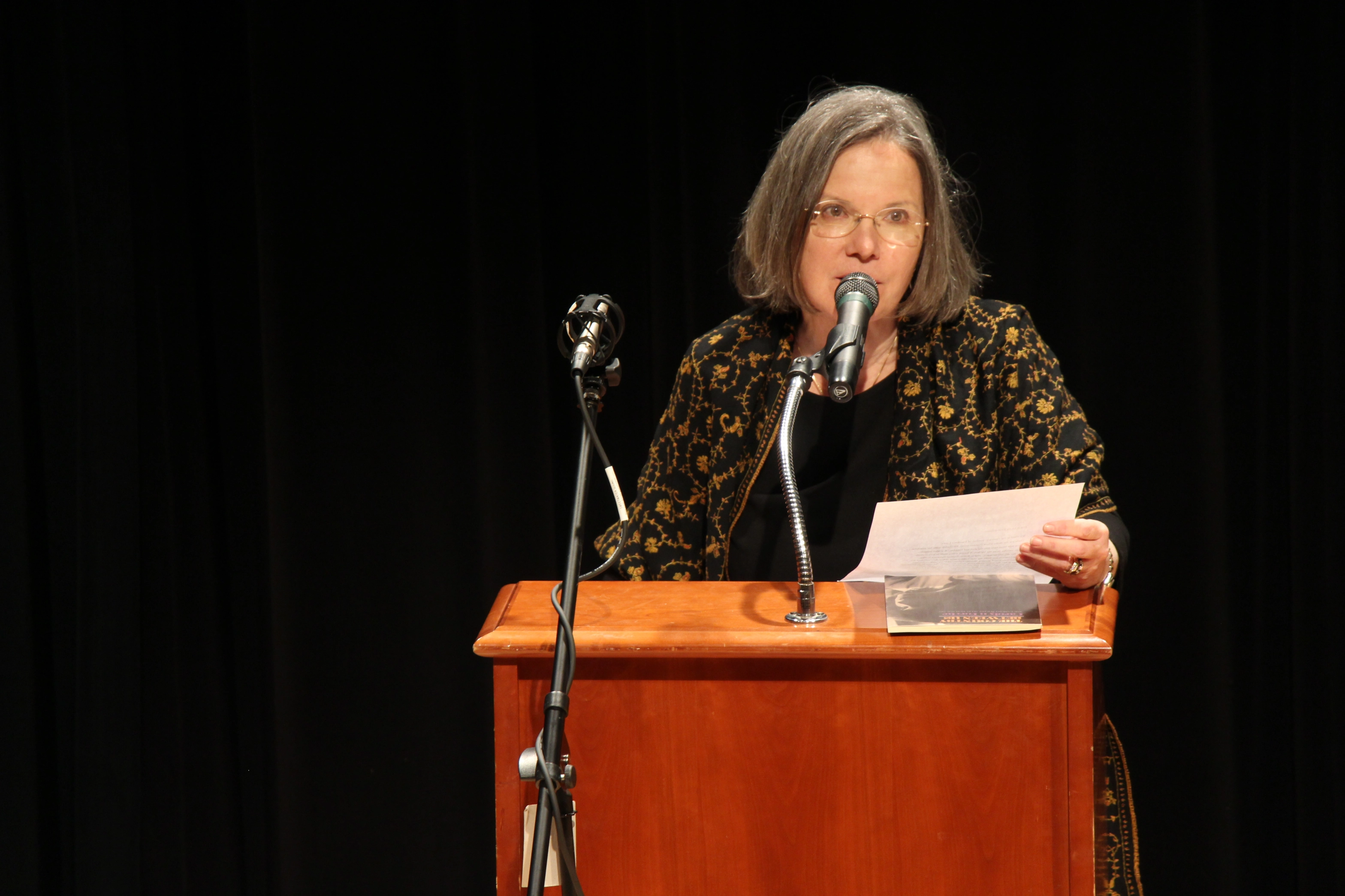Renowned poet, activist, and MSU alumna Carolyn Forché returns to campus
May 7, 2015 - Kelsey Block

The Residential College in the Arts and Humanities Center for Poetry was proud to welcome Michigan State University alumna and poet Carolyn Forché to campus on April 22 and 23. Forché joined the Center as a part of its annual Spring Poetry Festival, which is held in conjunction with National Poetry Month in April.
Crowds packed into the RCAH Theater for a poetry reading on Wednesday, April 22, and reconvened the next day at the Main Library to listen to Forché talk about her experiences writing and working internationally.
Forché, a Detroit native, first got started writing poetry on a snowy winter day when she was 9 years old. School was cancelled, and to keep chaos at bay, Forché’s mother assigned each of her seven children a task. Carolyn’s was to write a poem.
So, Forché’s mother took a book of poetry down from the shelf and taught her a bit about the structure of a poem, and Forché got to work.
“I wrote a very boring poem about snow and I became enchanted with writing,” Forché said.
Her newfound joy for writing merged with her interest in reading and Forché was hooked.
“It was a bit audacious,” she said, laughing. “I felt as a child I could write like the authors of the books were doing. I somehow knew I could do it.”
Forché went on to study at Michigan State University, where she met her mentor, English Professor Linda Wagner-Martin. Years later, Wagner-Martin would be the one to encourage Forché to apply to graduate schools.
Forché earned her MFA from Bowling Green State University, which is where she got her first taste of teaching. During her time at Bowling Green, she was tasked with teaching a freshman composition course.
“I had to teach them well enough that they would pass a written exam at the end in order to stay enrolled at the college,” she said. “It was challenging and wonderful. I would never have thought of myself as a teacher prior to that, but I discovered that’s what I wanted to do.”
Forché won the Yale Younger Poets Prize soon after she graduated from Bowling Green. At the time, she was teaching at San Diego State University. She received a message from another professor that she had missed a telephone call from someone in Connecticut. Forché didn’t know anyone in Connecticut, and she remembers she was hesitant to call the number back. When she did, the director of the Yale University Press informed her she won the prize and would have her first book published.
“I danced around the office and I was very excited. I started to cry. It was what you would expect of a young person who now knows that she’ll have her first book published,” she said.
Forché believes wining the prize led her to new heights in her career. Not long after winning the prize, she was appointed to a new, tenure-track position at San Diego State, something she says would not have happened otherwise.
In addition, it was her time in San Diego that, eventually, led her to El Salvador. Well, that and a “torrential rainstorm.”
Forché was visiting a friend in San Deigo one day when it began to rain. She decided to hang around a while and wait for the rain to let up, and while she was waiting, she read some of her friend’s mother’s poetry, which was written in Spanish. Forché was so moved by the work that she decided to translate it to English. She spent a summer in Spain working on the project. Not long after, she received a John Simon Guggenheim Foundation Fellowship, which led her to El Salvador, a country on the verge of war.
“I didn’t really understand that to be the case at the time. El Salvador was not a country that was well-known to Americans,” she said. She traveled there intending to study, not to get wrapped up in something much bigger.
Since then, Forché has written a number of pieces on her time in El Salvador, nonfiction as well as poetry. Internationally, she’s known as a “poet of witness.” She’s currently working on a memoir.
“I didn’t set out to write poetry about El Salvador. I did set out on occasion to write journalism about El Salvador, but poets don’t have any choice really about what they’re writing about,” she said. “I understood my role to be to speak about the conditions there, to try to help the people in my own country to understand what was causing the disruption and the war … I didn’t consider myself a political person; I considered myself a person trying to do the right things.”
Forché feels it’s especially important for writers to stay in tune with current events.
“I don’t understand how something serious could emerge from hand of someone who’s not paying attention to the world,” she said. “The more one knows, the larger the sphere for the writing, the more available the world is to you. I don’t think we can never know enough or experience enough. I don’t think it’s a question of politics but of human community and our relations with each other.”

